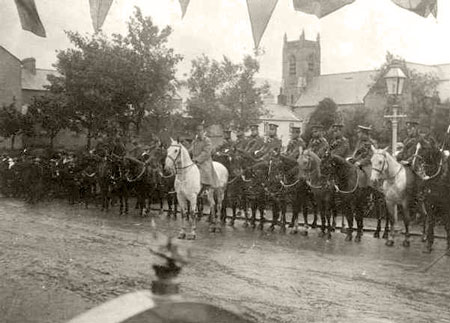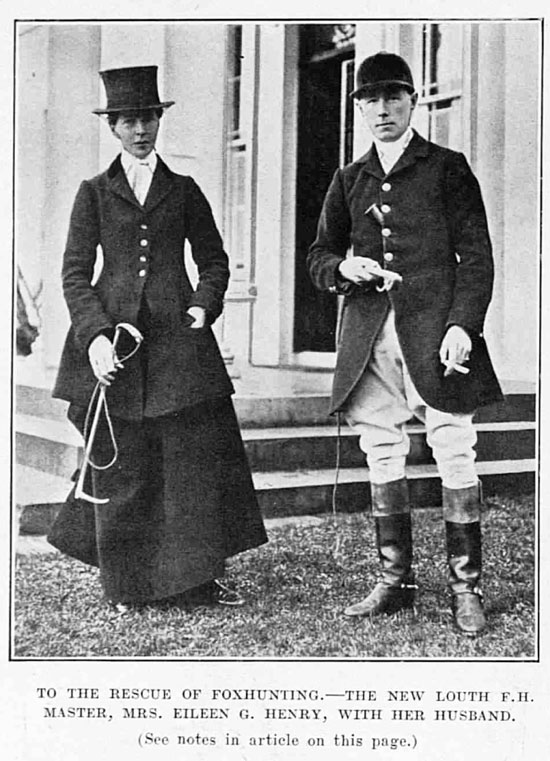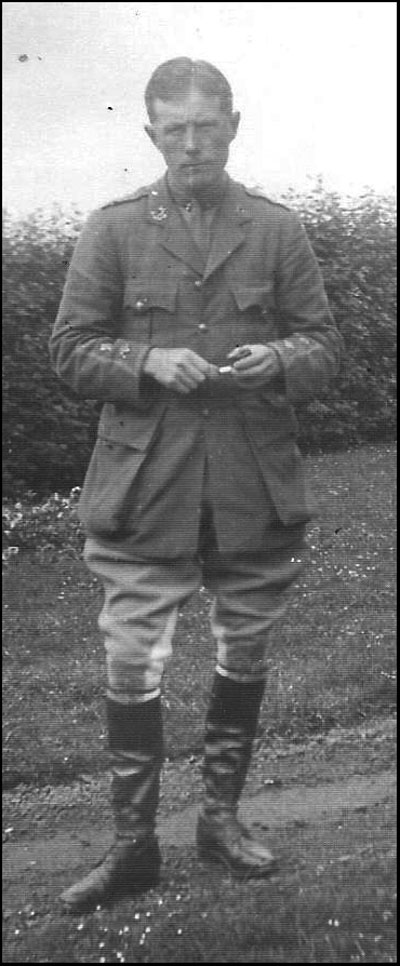Captain Richard Alexander Baillie Henry (later Filgate)
Richard Alexander Baillie Henry was born on 12 June 1877 at Donaghmoyne, County Monaghan, son of Richard Baillie Henry and his wife Anna Sophia (nee Bolton).
Henry, a wealthy landowner, was Huntsman and Deputy Master of the Louth Hounds before the war, deputing to his father-in-law Captain Filgate. His brother, Lieutenant Robert Clive Bolton Henry of the 2nd Royal Dublin Fusiliers, had been killed in December 1899 at Colenso during the Boer War.
On the outbreak of war Henry was living with his wife Ellen Georgina (nee Filgate) at his father-in-law's estate at Lisrenny, County Louth.
He applied for a commission and on 15 September 1914 was made a lieutenant in the Army Service Corps. On 3 January 1915 he transferred to the North Irish Horse and on 15 July that year embarked for France, where he joined C Squadron in the field. He was appointed captain on 18 November 1915.
The war diary of C Squadron includes references to Captain Henry leading a working party to the trenches, leading a party attached to V Corps Headquarters, and taking a party to man a 36th Division artillery observation post.
In June 1916 C Squadron joined with B Squadron of the North Irish Horse and the 6th (Inniskilling) Dragoons Service Squadron to form the 2nd North Irish Horse Regiment. It appears that Henry was transferred to B Squadron. Over the next year the regiment's diary includes a number of references to Captain Henry taking command of working parties in the trenches and on road control duties. On 9 September 1916 it noted:
There was a regimental race meeting at Contay and Capt Henry of B Squadron had a horse entered in "The New Derby" so a good many of the Regiment rode over to the meeting. Unfortunately Mr Smart who rode the Horse made a mistake and rode the wrong course after he practically had won.
In April 1917 Henry assumed the surname and arms of Filgate in lieu of his patronymic by Royal Licence, in compliance with will of his father-in-law.
In September 1917 the 2nd North Irish Horse Regiment was dismounted and absorbed into the 9th Battalion, Royal Irish Fusiliers. Captain Filgate was transferred to the new battalion but claimed that he was unable to do the marching required of infantry due to his age and rheumatism of the hip brought on by an old hunting accident.
A medical board at Le Havre on 1 October agreed, finding him permanently unfit for frontline service. He was instead seconded for employment with the Military Police and put in command of a Prisoner of War Company.
This was not to his liking and in January 1918 he sought permission to resign his commission "on the grounds of doing work of national importance".
I farm 1300 acres in Co Louth Ireland, all in my own hands. It is impossible to get the land worked to the best advantage in my absence, and I think that I would be doing far better work for the nation in the production of food than in my present employment in a Prisoner of War Company. These 1300 acres comprise two farms lying 2½ miles apart, one farm containing about 1000 acres the other 350 acres. There are about 200 acres under corn, turnips, potatoes, and new meadows, the rest under pasture and old meadows. I managed the smaller farm personally before the war, and in 1916 inherited the larger one, which for a great number of years had been badly managed and was very much run out. My wife who has been trying to carry on for me in my absence, finds that on account of the size of the farms, the amount of tillage, and the difficulties of labour, she is unable to work the farms properly. My medical category is PU [permanently unfit] on account of suffering from rheumatism. I am 40 years of age. I joined the army in August 1914 and have served in France since July 1915. ...
Captain Filgate's request was accepted and he resigned his commission on 28 March 1918.
He died 16 November 1967.


Filgate (on the grey) on parade at Warrenpoint, 1915

The Illustrated Sporting and Dramatic News, 2 October 1915.
The article states "With respect to the photograph we are able to reproduce on this page of Mrs. E. G. Henry and her husband (the latter is at present on active service as a lieutenant in the North Irish Horse in Flanders), this lady must be warmly praised for doing what she can to keep hunting going, since there is no one else who could well assume the office of Master in the Louth country under existing circumstances. Practically every gentleman in the county who could do so is serving the King in some capacity. There seem to be plenty of foxes in this district, and Mrs. Henry will try to kill as many as she can this winter. The country people have been very good about preserving, although the Louth were not able to hunt nearly as much as usual last season, and everyone will wish Mrs. Henry the best of good fortune in her effort to carry on as usual."

Henry's brother, Lieutenant R.C.B. Henry of the 2nd Royal Dublin Fusiliers
Image 1 kindly provided by Mrs Sarah Angel of Kilcock, Co Kildare, via Barrie H Bertram and his Channel Islands Great War Study Group website www.greatwarci.net. Images 2 and 3 sourced from the North Irish Horse Regimental Association site. Image of Lieutenant C.B. Henry sourced from The Second Battalion Royal Dublin Fusiliers in the South African War, by Cecil Francis Romer and Arthur Edward Mainwaring, via Barrie Bertram.

